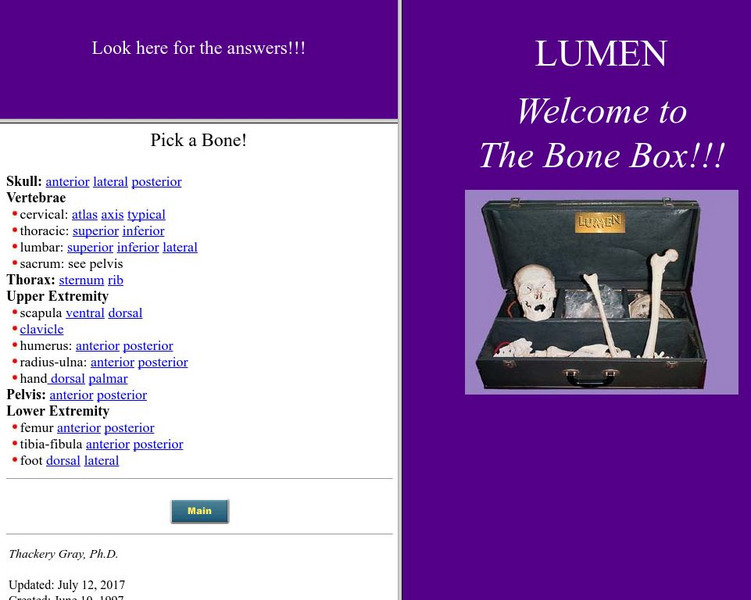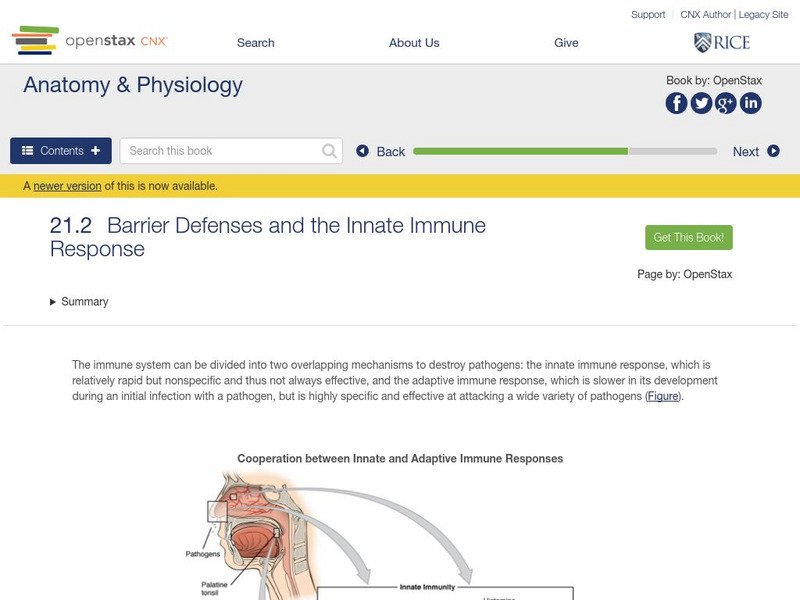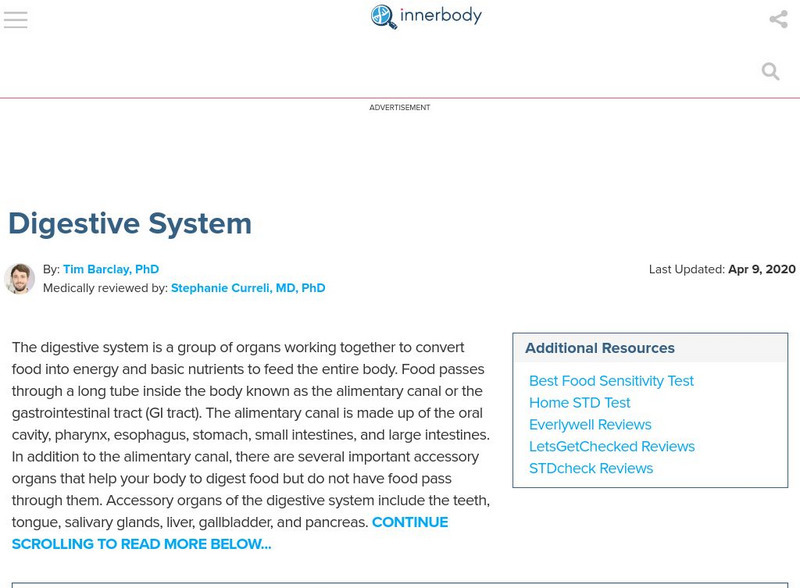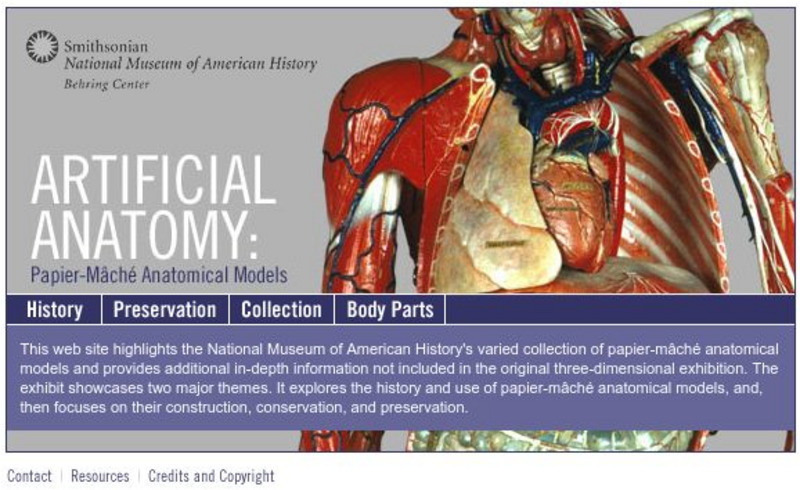National Health Museum
Access Excellence: The First Steps of Human Vision
Describes the contributions of scientists over hundreds of years leading to our current understanding of the eye and vision.
Loyola University Chicago
Loyola University Medical Education Network: Welcome to the Bone Box
An interactive site that provides a picture of a skeleton segment. On the picture is a number with a line pointing to a part of the skeleton. When you click on the number the part is identified.
OpenStax
Open Stax: Anatomy & Physiology: Barrier Defenses and Innate Immune Response
Students use this module to learn about the barrier defenses and the immune defense functions of the human body.
Gateway Community College
James Crimando: Nervous System
Learn about the anatomy of the human brain.
Alabama Learning Exchange
Alex: Systems Every "Body" Needs to Know
This lesson is designed to allow learners to explore the human body through a WebQuest with Internet and multimedia resources provided for research. Students will create a cell diagram, write a letter, and create a slideshow presentation...
Inner Body
Innerbody: Digestive System
Take a look inside the human body's digestive system. This site features diagrams of the digestive tract and each part is accompanied by labels and descriptions. Just select an organ by moving the mouse over its image.
Gateway Community College
James Crimando: Respiratory System
Learn the anatomy of the human respiratory system.
Gateway Community College
James Crimando: Cardiovascular System
Learn the anatomy of the human cardiovascular system.
Gateway Community College
James Crimando: Digestive System
Learn about the anatomy of the human digestive system.
TeachEngineering
Teach Engineering: Out of Breath
This lesson goes over the parts of the human respiratory system and the gas exchange process that occurs in the lungs. It also covers changes in the respiratory system that occur during spaceflight, such as decreased lung capacity.
NASA
Nasa: 1nd Century Explorer: How Would Your Body Change in Space?
This article explores the changes an astronaut's body goes through in space. Also find the answer to many other fascinating questions people have about space travel.
OpenStax
Open Stax: Functions of Human Life
The different organ systems each have different functions and therefore unique roles to perform in physiology. These many functions can be summarized in terms of a few that we might consider definitive of human life. Learn here about the...
OpenStax
Open Stax: Requirements for Human Life
Earth and its atmosphere have provided us with air to breathe, water to drink, and food to eat, but these are not the only requirements for survival. Although you may rarely think about it, you also cannot live outside of a certain range...
Texas A&M University
Human Physiology in Space
Learn about some of the environmental challenges facing humans in space.
Smithsonian Institution
National Museum of American History: Artificial Anatomy: Papier Mache Models
Online exhibition examines an interesting sidelight in the history of medicine: the use of papier-mache anatomical models. Learn about the history of medical dissection, why the models were made, and their construction and conservation....
OpenStax
Open Stax: Anatomy & Physiology: Skeletal System Functions
This site helps you understand the human skeletal system, a body system composed of bones and cartilage that performs critical functions for the human body.
PBS
Nova: Making Vaccines
Explore the production of six different types of vaccines. This activity is interactive, allowing you to take part in the production of the different vaccines.
University of Washington
The Senses
This site has a collection of learning activities, games, experiments, and lesson plans on the five senses. Organized by grade level and topic, this site is packed with an assortment of interactive and engaging activities, that would...
University of Arizona
The Biology Project: Human Biology: Dna Forensics Problem Set 1
Students have the opportunity to interpret actual case results from the use of the Restriction Fragment Length Polymorphism (RFLP) method to characterize human DNA samples as applied in paternity analysis and sex crimes investigations.
Science Buddies
Science Buddies: The Nose Knows Smell but How About Taste?
As if sniffles and clogged sinuses are bad enough, everything seems to taste bland and flavorless when we are sick. Gather up a few volunteers, hit the kitchen, and try this experiment to find out if there is really truth to the idea...
Science Buddies
Science Buddies: Do You Love the Taste of Food? Find Out if You're a Supertaster
To supertasters, the flavors of foods are much stronger than to average tasters. This can explain why some people are more picky about their food than others, because they experiences tastes in a much stronger form. Find out if you are a...
Science Buddies
Science Buddies: Breath of Life: Does Exercise Increase Vital Capacity?
When you take a deep breath, the amount of air you are capable of holding within your lungs, is known as your lung capacity. It is not the same for everyone. This lab asks you to find out if it is possible to increase your lung capacity...
TeachEngineering
Teach Engineering: Digestion Simulation
To reinforce students' understanding of the human digestion process, the functions of several stomach and small intestine fluids are analyzed, and the concept of simulation is introduced through a short, introductory demonstration of how...
National Institutes of Health
U.s. Dept of Health and Human Services: Cancer and the Environment [Pdf]
Document provides information on the causes and nature of cancer and particularly the substances in the environment that are known to cause or may cause cancer in humans such as tobacco, ultraviolet radiation, pesticides, and metals.


















![U.s. Dept of Health and Human Services: Cancer and the Environment [Pdf] Website U.s. Dept of Health and Human Services: Cancer and the Environment [Pdf] Website](https://content.lessonplanet.com/knovation/original/224070-96b08e2e287ce61f7938dd5f317a86cb.jpg?1661495292)